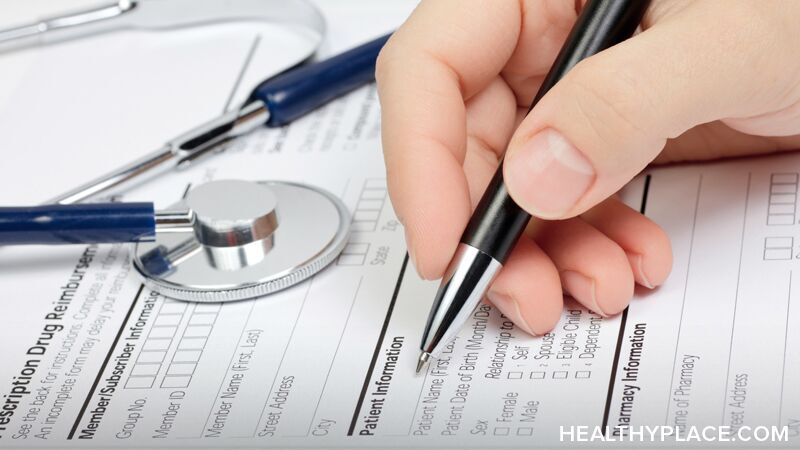How Is Bipolar Disorder Diagnosed?

How is bipolar disorder diagnosed? This is one of the first questions most people ask when they’re showing bipolar symptoms. Unlike with other, more common, mental health conditions like depression and anxiety, you cannot walk into your doctor’s office and leave with a bipolar disorder diagnosis.
Bipolar disorder is complex, and it shares traits with other conditions such as major depressive disorder and borderline personality disorder. Misdiagnosing bipolar disorder, and consequently mistreating bipolar disorder, can be dangerous, so how do you know you've got the right diagnosis? Find out how bipolar disorder is diagnosed and who is qualified to make the call.
How Is Bipolar Disorder Diagnosed, and How Long Does It Take?
For bipolar disorder to be diagnosed, your symptoms must meet the diagnostic criteria set out by the DSM-5 (Diagnostic and Statistical Manual of Mental Disorders), published by the American Psychiatric Association. In addition to comparing your symptoms to this criteria, your doctor may also perform other tests (try this online bipolar test).
A bipolar disorder diagnosis consists of a thorough evaluation, usually taking place over several appointments. No one test can detect bipolar disorder, but an assessment of your symptoms may include:
- Physical exam: Your doctor may perform a physical exam and run blood tests to rule out any medical issues that could be causing or contributing to your symptoms.
- Mood charting: You may be asked to record your moods over a period of weeks or months so that your doctor can chart your symptoms of mania/hypomania and depression.
- Psychiatric assessment: You will most likely be referred to a psychiatrist who will assess your behavioral patterns, ask questions about your and your family’s history of mental illness and examine any other contributing factors.
If a child or teenager is suspected of having bipolar disorder, the diagnostic process may be different. In this case, a referral to a child psychiatrist and specialist treatment is usually recommended.
Who Can Provide a Bipolar Diagnosis?
Now we've examined how bipolar disorder is diagnosed, let's look at who is qualified to provide a diagnosis.
Your primary care provider is unlikely to be able to diagnose bipolar disorder. Because bipolar is relatively uncommon, affecting only 2.8% of the population, and because treatment is so specific, it should only be diagnosed by a medical doctor who specializes in mental health. In most cases, a psychiatrist or psychologist is most qualified to assess whether you meet the bipolar diagnosis criteria.
Bipolar Misdiagnosis: Why Does It Happen?
Bipolar disorder is frequently misdiagnosed. According to recent medical research, around 20% of people with bipolar disorder may be mistakenly diagnosed with depression. This occurs because the symptoms of bipolar II disorder are similar to those of major depressive disorder, with most people experiencing more depressive episodes than periods of hypomania.
What's more, unlike full-blown mania, hypomania is easy dismissed as someone being "normal" or seeming more productive and sociable than usual. Some people misunderstand the symptoms of bipolar disorder and think they can't possibly have the condition because their mood changes don't follow a regular pattern.
Bipolar disorder doesn’t always present as we see it in movies and on television. If you think you’re experiencing symptoms of bipolar disorder, such as episodes of depression and mania or hypomania, you must consult your doctor, who will refer you for help and treatment.
Is Bipolar Under or Over-Diagnosed?
Many people believe that bipolar II is under-diagnosed and that more people have the condition than we realize. On the other end of the spectrum, some researchers believe that bipolar disorder is over-diagnosed because of the pressures put on doctors not to “miss” symptoms. Aggressive marketing of mood-stabilizing medications by pharmaceutical companies could also be to blame, according to a 20-year research review that was published in 2016.
Misdiagnosis can be dangerous, not simply because of unmanaged symptoms of mania or depression. If you are misdiagnosed with depression and prescribed antidepressants when you actually have bipolar disorder, for example, your medication may trigger symptoms of mania. What's more, someone who believes that they have treatment-resistant depression (TRD) may never receive appropriate treatment for what is actually bipolar disorder.
Bipolar Self-Diagnosis: Is It Possible?
Meeting the symptom criteria for a bipolar diagnosis is not enough to determine that you have the disorder. The only way to know for sure that you have bipolar disorder is to be diagnosed by a trained and qualified mental health professional; even then, it’s important to keep a check on your symptoms and be referred back for regular check-ups. Bipolar disorder is easy to misdiagnose, and its symptoms do change and evolve over time.
The dangers of bipolar self-diagnosis include:
- Going untreated: Most people with bipolar disorder are treated with a combination of mood stabilizers, antipsychotic medications and talk therapy. If you are not correctly diagnosed and your symptoms remain untreated, you could put yourself at risk – particularly if you experience mania and/or major depression.
- Substance abuse: Many people with bipolar I or II avoid alcohol and non-prescription drugs to avoid triggering manic or depressive episodes. Without proper treatment, however, mania often leads to alcohol and drug misuse, which can be fatal.
- Relationship challenges: Bipolar disorder can cause behavioral symptoms such as hypersexuality, poor decision-making and erratic, impulsive speech and actions. If you don't treat these symptoms, they can lead to relationship problems that in turn isolate you from your support network.
- Financial stress: Impulsive spending is one of the hallmark symptoms of a manic or hypomanic episode. Left unmanaged, this symptom can leave you in financial jeopardy and cause you to lose assets, such as your house, car or savings.
- Other physical and mental health challenges: Aside from the short-term effects of a bipolar self-diagnosis, there are also long-term risks, such as more frequent episodes, ongoing delusions, worsening of symptoms and other related illnesses like alcoholism, insomnia and even cardiac symptoms.
The process of a bipolar diagnosis is long and complex precisely because the risks of misdiagnosis and self-diagnosis are so great. Although you may come across tests or questionnaires online claiming to provide a bipolar diagnosis, there is only one way to access the right diagnosis and treatment, and that is by consulting your doctor and requesting a psychiatric referral.
APA Reference
Smith, E.
(2021, December 28). How Is Bipolar Disorder Diagnosed?, HealthyPlace. Retrieved
on 2026, February 21 from https://www.healthyplace.com/bipolar-disorder/bipolar-diagnosis/bipolar-diagnosis-and-how-to-diagnose-bipolar-disorder


